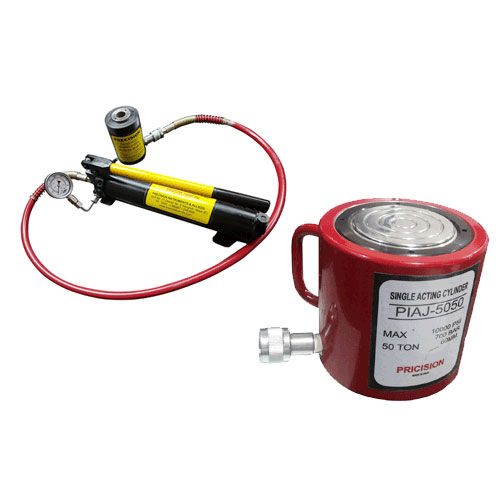Hydraulic Jacks
What is Hydraulic Jack?
A Hydraulic Jack is a device that uses hydraulic pressure to lift heavy loads. The method by which pressure is applied varies depending on the specific type of jack, but usually involves a screw thread or hydraulic cylinder. A hydraulic jack is commonly used in the automotive and industrial sectors for lifting and levelling heavy objects such as vehicles, machinery, and structures.
The working of a hydraulic jack involves creating pressure by moving oil through two chambers via a pump plunger. The pump plunger is moved back, which opens the suction valve and brings oil into the pump chamber. As the plunger is pushed down, the oil is transported through an external release valve and into the chamber. The suction valve then closes, resulting in pressure being built up inside the chamber and causing the piston in the chamber to rise and lift the heavy object. This process can be repeated several times, allowing the load to be lifted higher and higher.
Hydraulic jacks have a wide range of applications in various industries, including construction, mining, manufacturing, and transportation. They are commonly used for lifting heavy equipment, levelling foundations, and adjusting the height of heavy loads.
GM Industries is among the leading hydraulic jack manufacturers in India. Our products are known for their durability, reliability, and high-performance capabilities. The company offers a wide range of hydraulic jacks, including bottle jacks, floor jacks, and jack stands, which are used in various industries around the world. With a commitment to quality and customer satisfaction, GM Industries continues to be a trusted name as one of the hydraulic jack suppliers in the hydraulic equipment industry.
Hydraulic Jack Price
The Hydraulic Jack Price offered by Hydraulic Jacks Manufacturers is listed below: –
| Product Range | Price |
| Hydraulic Jack | ₹ 18,000 / Unit |
(Prices shown above are provisional prices and may change due to different market conditions and requirements.)
For more information on any of our high quality products or getting accurate prices contact GM Industries at
Call Us
+(91)-9820533489 / 7738562224
Enquiry Form
Submit
How Does a Hydraulic Jack Work?
The working principle of a hydraulic jack involves the use of a hydraulic cylinder to lift heavy loads. The hydraulic cylinder consists of two chambers separated by a piston. One chamber is filled with hydraulic fluid, typically oil, and the other chamber is left empty.
To lift the load, a force is applied to the hydraulic fluid using a pump or plunger. This creates pressure in the fluid, which pushes against the piston, causing it to move upward. As the piston moves upward, it lifts the load that is resting on top of the piston.
The hydraulic jack works on the principle of Pascal’s law, which states that when pressure is applied to a confined fluid, the pressure is transmitted equally in all directions. In the case of a hydraulic jack, the force applied to the fluid is transmitted equally to the piston, which in turn lifts the load.
To lower the load, the pressure in the hydraulic fluid is released by turning a valve or releasing a lever. This allows the hydraulic fluid to flow back into the reservoir, and the weight of the load causes the piston to lower slowly.
Hydraulic jacks are commonly used in the automotive and construction industries for lifting heavy equipment and structures. They are also used in manufacturing and material handling applications for lifting and positioning heavy loads.
Advantages of Hydraulic Jacks
Hydraulic jacks offer several advantages over other types of jacks, including:
High lifting capacity
Hydraulic jacks are capable of lifting very heavy loads, often ranging from a few tons to several hundred tons. This makes them suitable for a wide range of applications in various industries.
Ease of use
Hydraulic jacks are relatively easy to use, requiring only a few simple steps to lift and lower a load. They also typically require less physical effort than other types of jacks, making them a popular choice for workers who need to lift heavy loads frequently.
Smooth and steady lifting
Hydraulic jacks lift loads in a smooth and steady manner, without any sudden jolts or jerks. This helps to prevent damage to the load being lifted and ensures that it is lifted safely and securely.
Increased safety
Hydraulic jacks are designed with safety in mind, with features such as overload protection and safety valves that prevent them from lifting more weight than they are designed to handle. This makes them a safer option for workers who need to lift heavy loads.
Durability
Hydraulic jacks are built to last, with strong and sturdy construction that can withstand heavy use in demanding environments. They also require less maintenance than other types of jacks, which helps to reduce downtime and increase productivity.
Versatility
Hydraulic jacks are available in a wide range of sizes and styles, making them suitable for a variety of applications in different industries. They can be used for lifting vehicles, machinery, buildings, and more.
Overall, hydraulic jacks offer a powerful and reliable solution for lifting heavy loads safely and efficiently. Their ease of use, smooth lifting action, and increased safety make them a popular choice in a variety of industries.
Applications of Hydraulic Jacks
Hydraulic jacks are used in a wide range of applications across various industries. Some of the most common applications include:
- Automotive industry: Hydraulic jacks are commonly used in automotive repair shops for lifting vehicles off the ground for maintenance and repairs. They are also used in car manufacturing plants for positioning and lifting heavy components.
- Construction industry: Hydraulic jacks are used in the construction industry for lifting and positioning heavy structures such as bridges, buildings, and steel beams. They are also used for lifting heavy machinery and equipment.
- Material handling: Hydraulic jacks are used for lifting and positioning heavy loads in material handling applications such as warehouses, factories, and ports.
- Aerospace industry: Hydraulic jacks are used for lifting and positioning aircraft during maintenance and repairs. They are also used in the construction of aircraft for positioning and lifting heavy components.
- Mining industry: Hydraulic jacks are used in the mining industry for lifting and positioning heavy equipment and materials such as conveyor belts, drilling machines, and excavation equipment.
- Marine industry: Hydraulic jacks are used in the marine industry for lifting and positioning heavy components such as propellers and rudders.
- Agriculture industry: Hydraulic jacks are used in the agriculture industry for lifting heavy equipment such as tractors and plows.
Overall, hydraulic jacks are used in a wide range of applications where heavy loads need to be lifted and positioned safely and efficiently. Their versatility and reliability make them a popular choice across various industries.

How do I choose a Hydraulic Jacks?
If you are in need of hydraulic jacks for your business or industry, GM Industries can help you find the right solution. As a reputable and experienced hydraulic jack supplier, GM Industries offers a wide range of products to meet the needs of various industries. Their knowledgeable staff can help you select the right hydraulic jack for your specific application, ensuring that you have the right tool for the job. With their commitment to quality and customer service, you can trust GM Industries to provide you with reliable and durable hydraulic jacks that will help you get the job done safely and efficiently.
Frequently Asked Questions
A hydraulic jack is a device that uses hydraulic pressure to lift heavy loads.
A hydraulic jack works by using a pump to create pressure in a fluid, which is then used to lift a heavy load.
There are several types of hydraulic jacks available, including bottle jacks, floor jacks, and toe jacks.
The lifting capacity of a hydraulic jack can vary widely depending on the specific model, but some can lift several tons of weight.
Yes, hydraulic jacks are designed with safety features such as overload protection and safety valves to ensure that they can be used safely.
To maintain a hydraulic jack, you should regularly check the fluid level, keep it clean, and have it inspected and serviced by a professional as needed.
The benefits of using a hydraulic jack include high lifting capacity, ease of use, smooth lifting action, increased safety, durability, and versatility.
Hydraulic jacks are commonly used in automotive repair, construction, material handling, aerospace, mining, marine, and agriculture industries.
To choose the right hydraulic jack for your application, you should consider factors such as the weight of the load, the type of surface it will be lifted from, and the required lifting height.
Yes, hydraulic jacks can be used in extreme temperatures, but the type of fluid used may need to be adjusted to ensure proper operation.
You should inspect your hydraulic jack before each use and have it inspected and serviced by a professional on a regular basis.
Yes, hydraulic jacks can be used for long periods of time, but you should follow the manufacturer’s recommendations for usage and maintenance.
Hydraulic jacks can pose environmental concerns if they leak hydraulic fluid, so it is important to properly maintain them and dispose of any spilled fluid appropriately.
To transport a hydraulic jack, you should secure it in a stable position and protect it from damage during transit.
No, hydraulic jacks are not safe for lifting people and should only be used for lifting heavy loads.
Yes, there may be regulations governing the use of hydraulic jacks in certain industries or applications, so it is important to be aware of and follow these regulations.
Yes, hydraulic jacks can usually be repaired if they break, but it is often more cost-effective to replace them.
To dispose of a hydraulic jack, you should check with local regulations for proper disposal methods or contact a professional for assistance.
If your hydraulic jack fails, you should stop using it immediately and have it inspected and repaired by a professional.
Hydraulic jacks can be purchased from a variety of sources, including online retailers, hardware stores, and industrial suppliers. GM Industries is a reliable manufacturer that offers a wide range of products to suit your needs.
